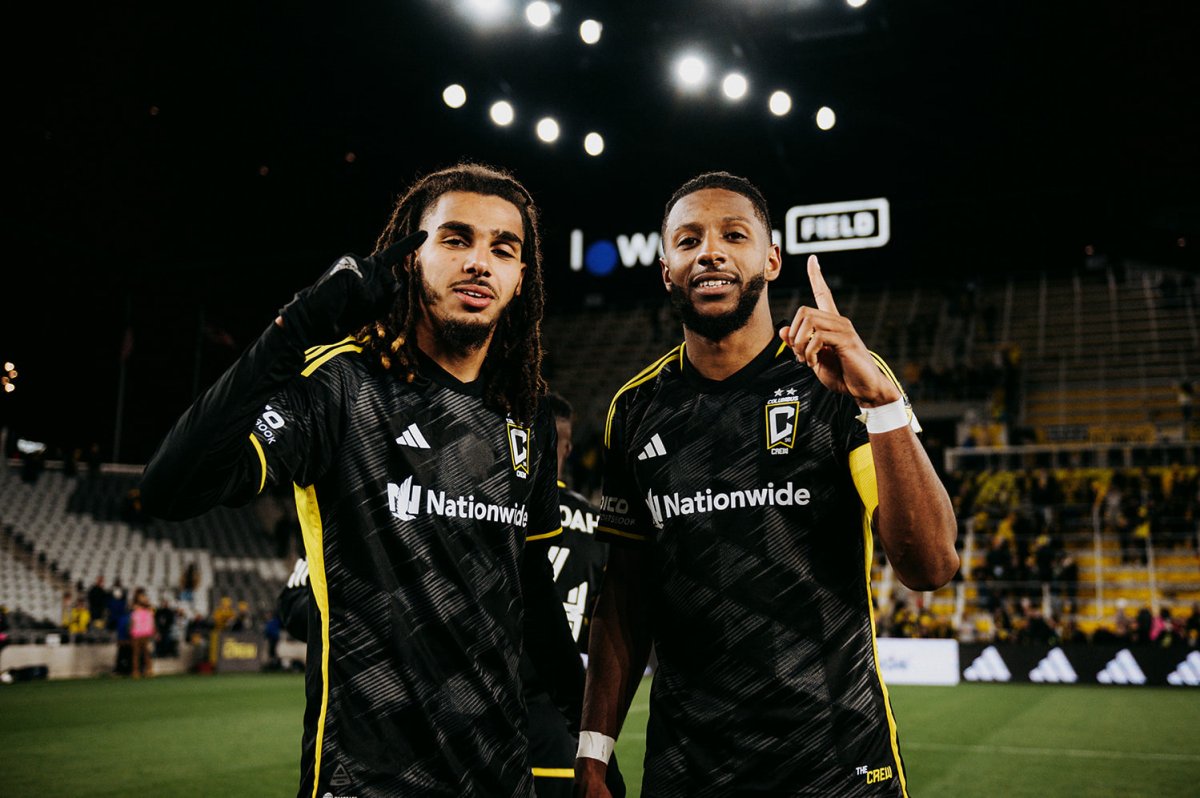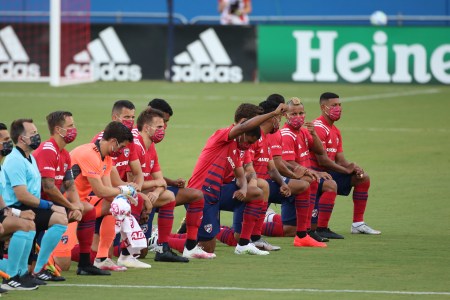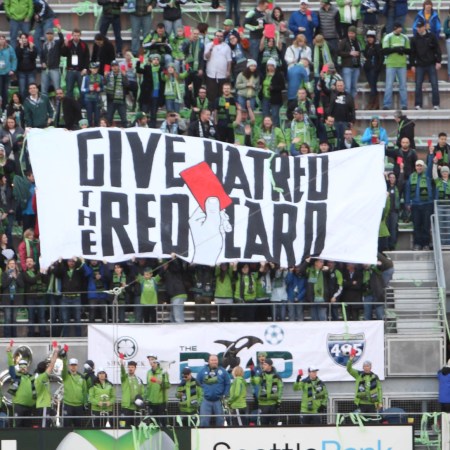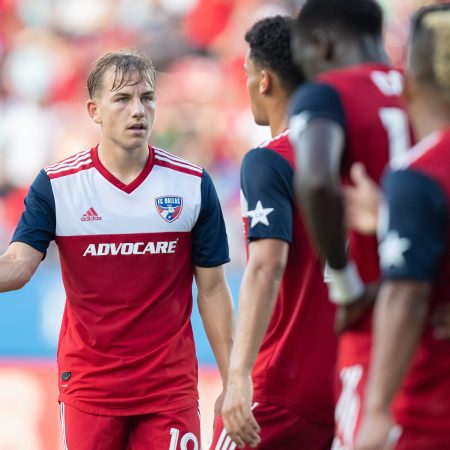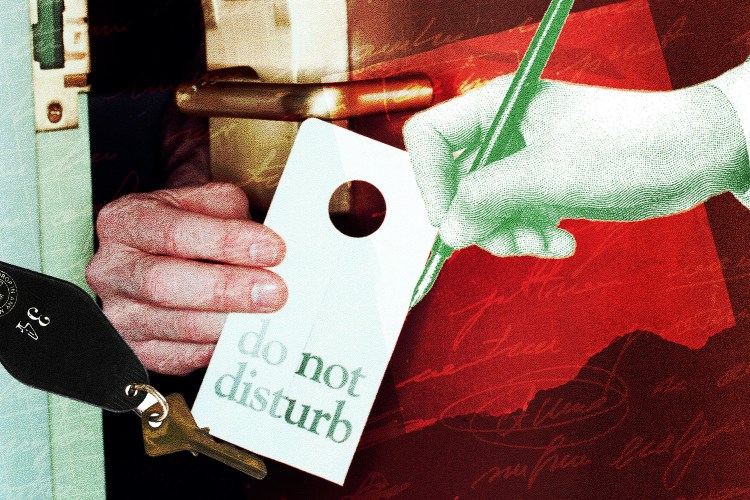Shortly after sunset in Columbus, Ohio, on Saturday, April 1, Mohamed Farsi and Steven Moreira, two Muslim men respectively from Montreal and Noisy-le-Grand, a suburb of Paris, took a knee next to each other and broke their Ramadan fast for the day. They first consumed a date, as is tradition per the practice of the prophet Muhammad, who once said, “Indeed, in dates there is a cure.” High in antioxidants, the fruit has long been used to treat a variety of illnesses, and they’re an ideal post-fast food because they’re easily digested and quickly provide energy.
Out of the 1.9 billion Muslims in the world — whose devout practitioners fast from sunrise to sunset during Ramadan in a display of their spiritual discipline and willingness to more deeply contemplate their relationship with God — Farsi and Moreira would need that energy boost more than most. They were 18 minutes into a professional soccer game. The modified version of their Islamic ritual was also being attended by personnel, teammates and more than 19,000 fans of the Columbus Crew.
“It’s emotional,” Kyla Cross, who’s been the Crew’s dietician for three years, tells InsideHook. “You get goosebumps when you watch it happening.”
Cross says she and the Crew lobbied for a brief timeout during evening MLS matches so that Muslim players observing Ramadan through daily fasting could obtain some nutrition and help them perform on the pitch. Soccer games are, of course, characterized by the sport’s uniquely long stretches of continuous play and a clock that only stops for halftime and at the final whistle. Those conditions turn the concept of a simple timeout into a potential car body-destroying speed bump, requiring deliberate navigation.
Fans Boo MLS Players Kneeling During National Anthem
Fans were back in attendance at Toyota Stadium in Frisco, TexasBut this year, the league made a “common-sense decision” to expand its policy of summer match hydration breaks, which allow members of both teams to consume fluids during a referee-initiated stoppage in games played under hot conditions. Now, when there isn’t an extended interruption of action — such as the scoring of a goal — within the first few minutes of nighttime game play during Ramadan, referees may call for a one-minute timeout so that Muslim players can break their fast.
“MLS is the most internationally diverse sports league in the world, and we’re committed to providing an inclusive environment for everyone,” said Jeff Agoos, the league’s senior vice president of competition and medical administration, in a MLSSoccer.com post. “We wanted to be as proactive as we could to meet the needs of our players during a very important time in their lives, and important to our clubs as well.”
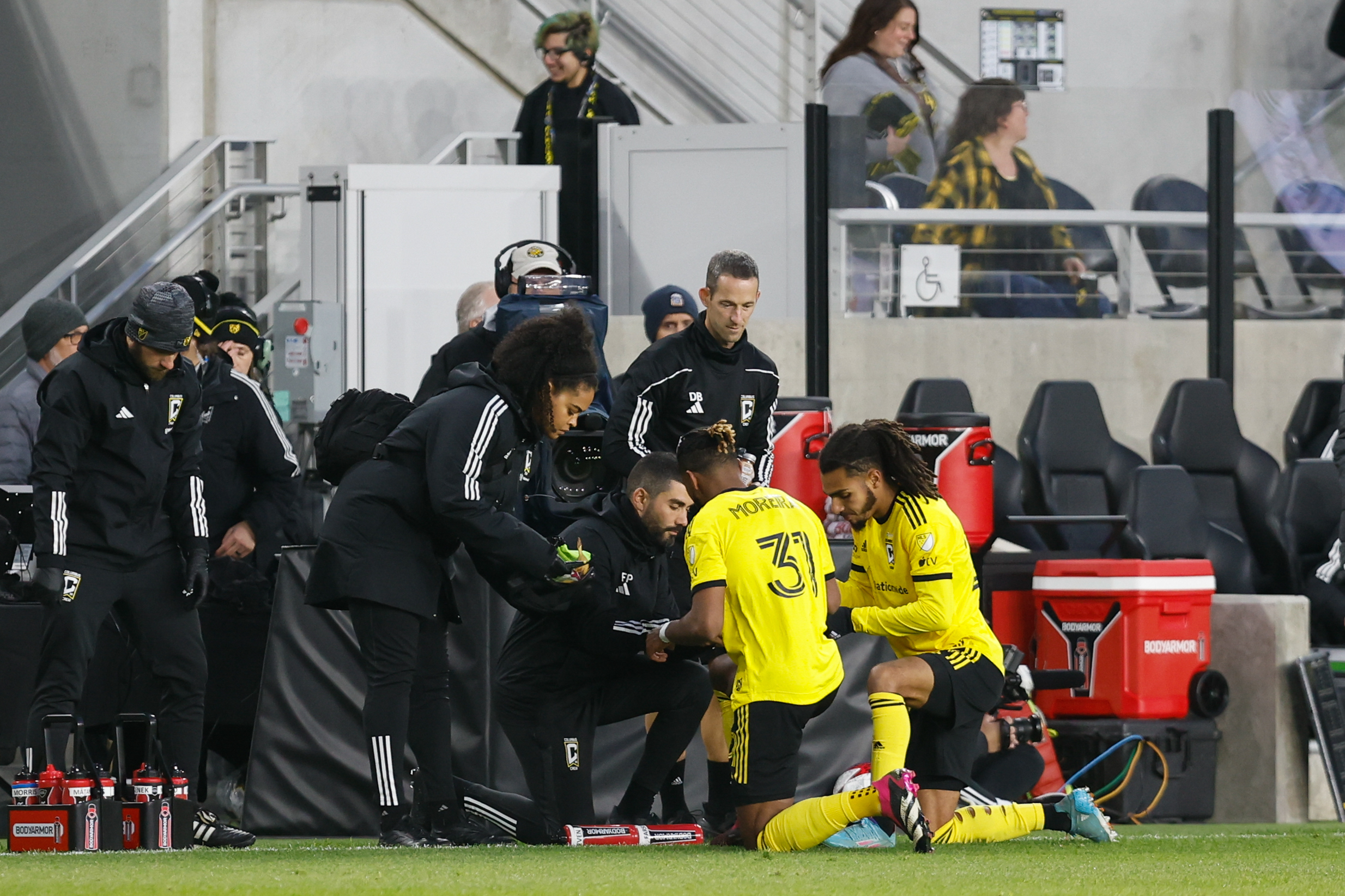
In a statement to InsideHook, Columbus Crew president and general manager Tim Bezbatchenko says the team applauds MLS for “fully recognizing the significance” of Ramadan and the fasting tradition for the league’s Muslim players.
“Soccer is the world’s game, and it is important that we are mindful and proactive about what is important to our players, staff and fans who have diverse backgrounds,” Bezbatchenko says. “The MLS’ implementation of a stoppage in play this season is reflective of the inclusive nature of our sport, as well as our collective dedication to ensuring our players are always in position to be their best on the pitch.”
The so-called “Big Four” North American major professional team sports leagues — the NFL, MLB, NHL and NBA — are also brands that consistently create new policy to generate even more widespread appeal, particularly in regions abroad. But none of them have a rule like the MLS’s Ramadan fast-break timeout. Because those sports have more natural instances of gameplay stoppages and time in which players recover on the bench while games continue, arguably such an initiative is not necessary. But multiple athletes, particularly football and basketball players, have discussed the challenges that come with being a pro athlete and a Muslim during Ramadan, a holy month in the Islamic year that could occur anytime during the Gregorian calendar. As we’re seeing in MLS, it only takes a minute to keep players from having to leave their team bench completely and put some nutrition in their system, as Kyrie Irving had to do in last year’s NBA playoffs, which fell in the Ramadan window. Irving’s off-court antics aside, forcing him, or any player, to retreat to the locker room to get food puts him and his team at a competitive disadvantage. It could put the player in a position where they feel pressure to compromise their religious beliefs as well.
When the in-match Ramadan break occurred on April 1, non-observing players on both the Crew and their opposing team, Real Salt Lake, also took in some fluids. After feasting on dates, Farsi and Moreira consumed sports gels, bananas, fruit snacks and sports drinks.
“In my day, certain guys just had to play through it,” said Apple TV’s match commentator Lloyd Sam, who competed in MLS between 2012 and 2017, as the scene unfolded. “You’d see them run after games to get food and stuff, so this is great.”
“[It’s] also an opportunity for coaches of both teams to whisper instructions into the ears of their players,” noted Sam’s broadcast partner, Eric Krakauer.
A league spokesperson tells InsideHook that the initiative, which was developed with collaborative input from the Professional Referee Organization, the group that manages referee programs in soccer leagues across the United States and Canada, was designed to not give a competitive advantage to one side or another. An hour prior to each MLS match, there is a meeting between team officials and the referees to discuss game protocols. It is in that meeting that, during Ramadan — which this year takes place between March 22 and April 21 — a club can request the fast-break timeout.
During the Crew’s previous game, a 6-1 victory over Atlanta United on March 25, Farsi and Moreira ate immediately after a goal that took place moments after sundown. On April 1 against Real Salt Lake at the Crew’s Lower.com Field, the home team went up 1-0 in the 14th minute, with a goal set up by a pinpoint 15-yard pass from Moreira through traffic into the penalty area. But sunset was still three minutes away, which necessitated the Ramadan fast-break stoppage in the 18th minute, signaled by the referee after a ball was kicked out of bounds.
When Cross told Moreira and Farsi — both of whom joined MLS within the past two years — that the MLS Ramadan-inspired timeout was going into effect, she says they were “so thankful and so excited.”
“That meant a lot,” she added.
But not just on an emotional level. In terms of logistics it mattered, too. Cross says during Ramadan this year she’s worked with Moreira and Farsi on their respective approaches to nutrition, sleep and training — tricky business given the physical demands of a sport like soccer, in which players run upward of seven miles during a game, not to mention the body taxation that comes from tackling, striking the ball and other bursts of action.
For any Crew player in the months outside of Ramadan, “ideally the goal is [for them] to eat about every three to four hours to keep them healed and actually help their bodies continue to build muscle adequately and fuel their body to do that process,” says Cross. But this schedule is radically disrupted for Muslim players during the holy month. On non-match days in Ramadan, Moreira and Farsi wake up prior to sunrise and consume smoothies and juices, even though the human body is challenged to actually feel hungry at that time, according to Cross.
“So I have given them [options] that can sometimes be easier [to consume] and can trick your stomach,” Cross says. “You’re not putting a ton of volume in, but you’re still getting a ton of carbs and protein in.” They might also have toast or a bagel with nut butter and/or fruit spread before going back to bed until they need to wake up and head to the team’s training facility. They’ll nap during the day and have their most robust meals after sunset — with dates, fruits, juices, teas and other items — and around midnight.
“As long as they’re getting at least those three meals with goals we set for carbs, protein, fat and calories, then I’m happy,” Cross says.
When Moreira and Farsi are faced with an evening MLS match during Ramadan, Cross says the in-game snack doesn’t replace what would otherwise be consumed across a day, but “we give them certain things to help them in the short term until they’re able to get to halftime and post-match” where they can chow down on more “concrete” nutrition. “That stoppage has been huge,” Cross continues. “It’s been very helpful for them just to get something to help fuel them for the rest of the game.”
After the April 1 game, Farsi quote-tweeted an acknowledgment of the timeout from Crew beat reporter Bailey Johnson, and added “Thank you @MLS” with the grateful-hands emoji. In this context, the palm-to-palm symbol can easily have religious connotations, too. Along with his family and his health, Farsi tells InsideHook that his Islamic faith, which has taught him to “be respectful of people and to have good comportment,” is the most important aspect of his life.
It’s also special, he says, that he is able to share the Ramadan fasting break with a fellow Muslim, Moreira, on and off the pitch, in a still relatively new location for him. “I think it’s a big thing mentally,” he says. “You know you’re not alone in this.” Asked if the MLS fast-break timeout helps him feel more included in the American soccer community and the league, Farsi responds: “100%, 100%.”
“It’s not my country, so I came here and see people making these initiatives to let us feel that we are at home and we are accepted — whatever religion, wherever you are from — and that’s beautiful,” he says.
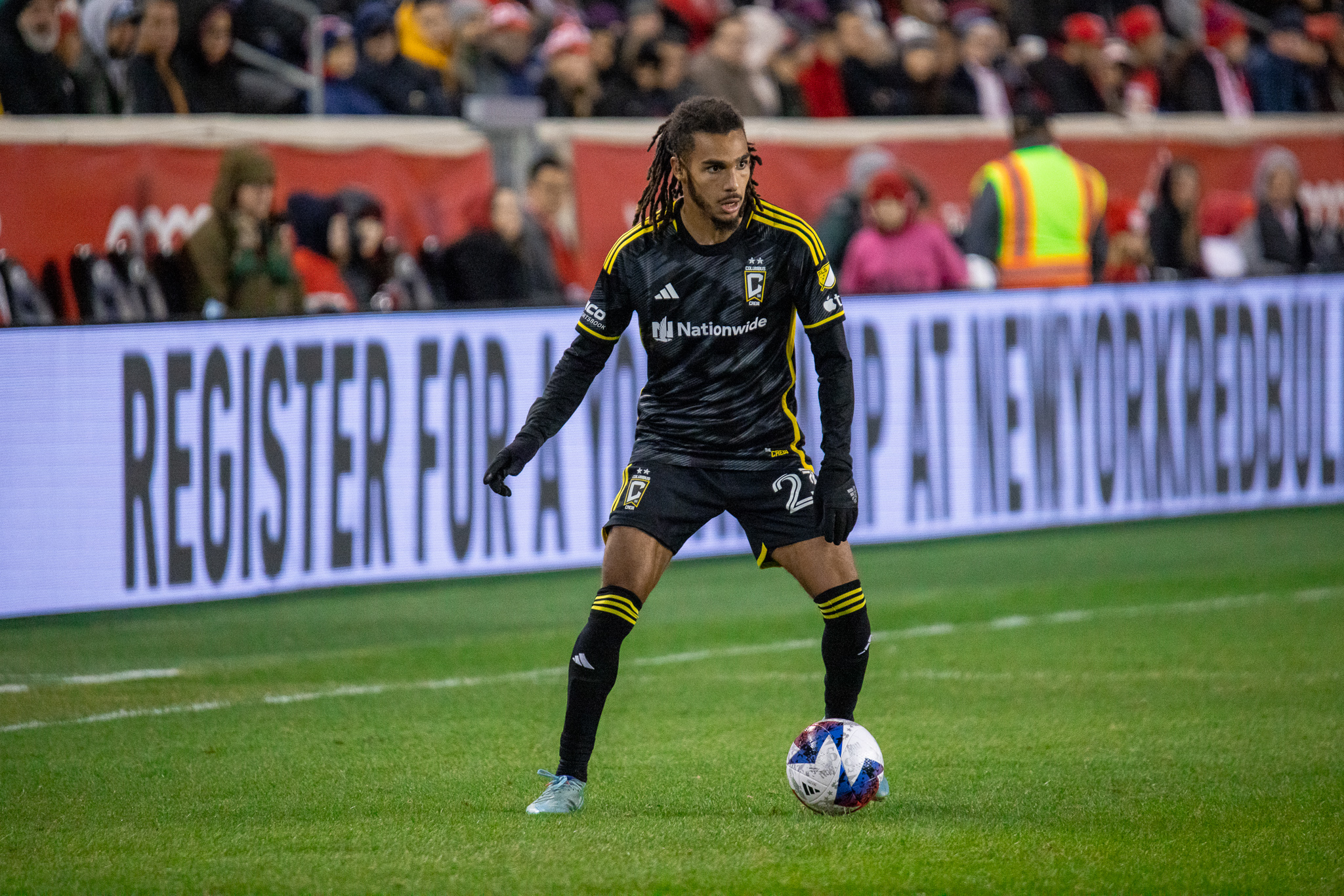
“Now it’s different [for me] because here they do everything to support me, to help me to play good, to train good, to help facilitate my fasting,” Moreira tells InsideHook. “When I played in France, you are just alone. You go home, you cook alone, and here it’s more different and communal.”
The referee snack and hydration break initiative, he says, makes him “feel more respected.” It also helped him perform. “Just because in my mind, I knew everybody would stop the game just for me and Mo, and I appreciated it,” he says. “I felt great mentally and physically.”
The Crew’s most committed fans, The Nordecke supporters group — who’ve influenced team decisions in the past and have hung banners in Lower.com Field with inclusive messaging, among other progressive actions — are happy with the new MLS stoppage time, too.
“Paired with the Crew’s decision to make a space in the stadium available for nightly prayers, this is a massive step toward inclusivity and celebrates the diversity of our roster, our fanbase and our city,” the organization said in a statement to InsideHook. Referring to the league’s inclusive social responsibility platform catchphrase, the group added: “We believe that MLS has the most diverse fanbase in American sports, and seeing the league and our hometown team embrace that diversity can only be viewed as a step towards true ‘Soccer for All.’”
The Premier League in England has allowed stoppages so its Muslim players can ingest some nourishment since 2021. A referee in Germany’s Bundesliga allowed a Muslim player to break his fast with a timeout during a match last year, which marked the first time an official in that league had ever done so. But the French Football Federation, which governs the sport across France, Moreira’s home country, sent an email to its referees shortly after the beginning of Ramadan this year instructing them not to allow such a game break to occur. “Football takes no account of the political, religious, ideological or trade union considerations of its actors,” the email reportedly said.
Some European players criticized the federation for its policy, as did many football fans on social media. One French player, Jaouen Hadjam, who plays for Nantes in the country’s top football league, was dropped from the team’s starting squad prior to a match against Stade de Reims. Hadjam’s manager, Antoine Kombouare, said he made the choice to do so out of concerns Hadjam would not be fit enough to play after refusing to break his Ramadan fast. “On matchdays, you should not fast,” Kombouare told reporters after Nantes’ 3-0 loss. “It is not a punishment. I set rules. It’s his choice and I respect it.” Another French coach, Didier Digard, who manages Nice, said while he was in favor of a rule change for the benefit of Muslim players in France, he added that “nobody cares that they don’t do it because we are not in a Muslim country. You have to accept the country you live in.”
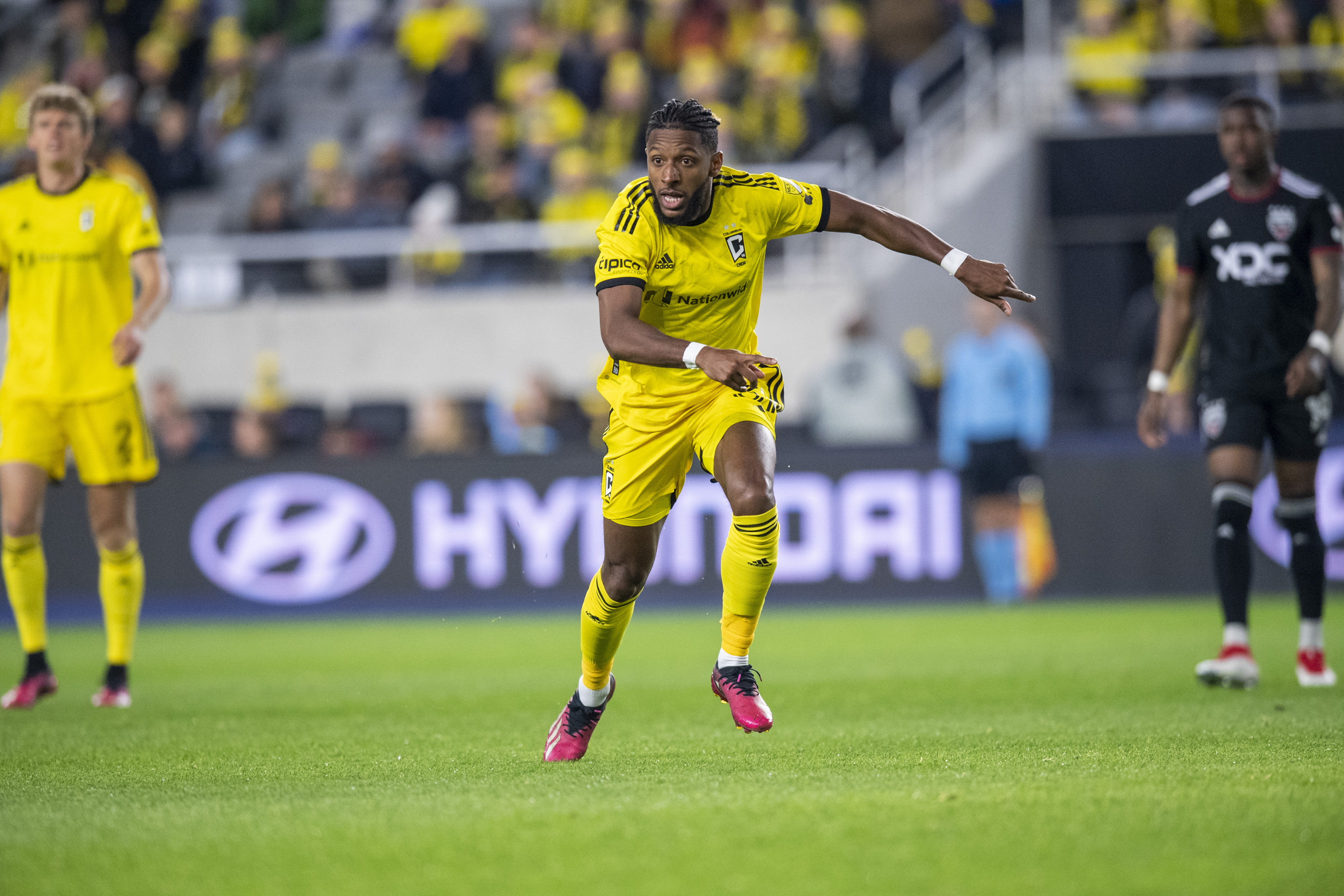
For many years prior to the new Ramadan timeout, MLS players residing in the United States and Canada — which are also not “Muslim countries” — had to make “tough calls,” as MLS’s own site defined them in 2012, about participating in games during the holy month of fasting. Doing so, especially across the summer months and stretches in which teams play multiple times a week, is quite challenging. But the minute-long game break helps make such decisions — and actually playing — much less difficult. That’s part of the reason why Chris LaMacchia, a Crew superfan and communications director of The Nordecke, says he wishes the league celebrated the initiative a bit more vividly.
“The announcers on Apple TV didn’t know [why there was a timeout], the home radio announcer didn’t know and it was only a tweet by the local newspaper reporter that explained what was happening,” LaMacchia tells InsideHook. “A quick heads up via any of the various available channels would have been appreciated, especially for the audience watching from home.” Still, he says he appreciates the fact that MLS “didn’t take a victory lap” and exploit the good-natured gesture in the name of publicity. LaMacchia also acknowledges that because it was “a first time thing” he understands the league might need to “get the wrinkles ironed out.”
For its website post about the Ramadan initiative, MLS interviewed the Crew’s Steven Moreira and Mohamed Farsi, as well as two other Muslim players from its top league and developmental league. However, generally there are privacy concerns. According to a league spokesperson, MLS won’t ever be completely sure about which matches will feature a Ramadan fast-break timeout ahead of the pre-game referees’ meetings, so as to not pressure players into more outwardly discussing their religious beliefs and practices. Going into this past weekend, the spokesperson said the league anticipated five or six games might be affected by the initiative, but wasn’t certain. In fact, the Crew’s match on April 8 did not feature a fast-break stoppage. They played in Washington, D.C., where the sun went down before kickoff, allowing Moreira and Farsi to enjoy some sustenance prior to game time.
Even without such a grand display that could have potentially been viewed by some fans as an alienating, perhaps politically charged maneuver, LaMacchia remains pleased that the league “took that step in the right direction” and created the Ramadan-inspired stoppage. “It’s really a big deal, especially in the current American sports landscape where the NHL is canceling pride nights and the NFL is being accused of woke-ism,” he says. “Makes me really proud to support MLS.”
The Charge will help you move better, think clearer and stay in the game longer. Subscribe to our wellness newsletter today.
